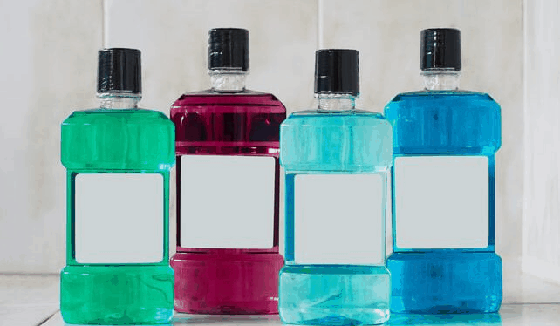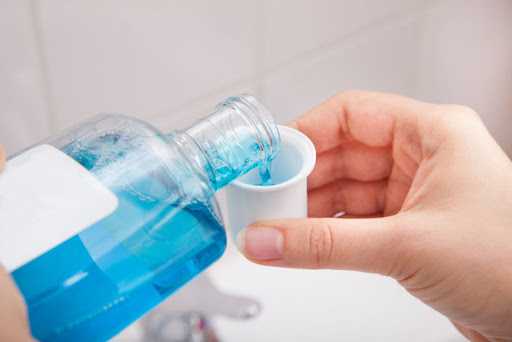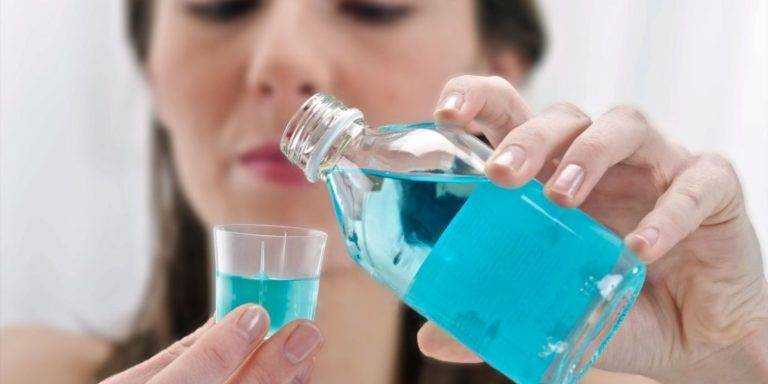Mouthwash is a special liquid that is used to rinse the mouth. Usually, mouthwashes are an antiseptic solution designed to lessen the microbial load in the oral cavity. However, different mouthwashes are made to serve different purposes such as for their analgesic, anti-sensitivity or anti-fungal action.
What does a mouthwash contain?
All mouthwashes contain some similar ingredients with some extra substances added to serve some unique purposes.
- Alcohol: It is a common element in most types of mouthwash. Improves the anti-bacterial effect of a mouthwash.
- Fluoride: Fluoride a chemical usually added to toothpaste and water, which helps to strengthen the teeth enamel. It also protects the teeth from cavities.
- Antiseptics: for example chlorhexidine gluconate and thymol. These help to protect the teeth periodontal disease or gum disease.
- Water Preservative: This element helps to keep the durability of the Mouth wash. It helps to keep the mouth wash Fresh for a longer time. for example sodium benzoate.
- Eucalyptol: This is an anti-inflammatory agent that furnishes mouthwash its pleasant taste and smell.
- Calcium: This agent is added to the Mouth wash to strengthen the teeth. However, it serves an almost similar purpose as Flouride.
- Sweeteners: This element will improve the taste of the Liquid. They include sodium saccharine and xylitol.

Types of Mouthwashes:
There are different types of Mouthwashes available in the market. You can choose this according to your need or with the recommendation of your dentist.
- Antiseptic mouthwash
- Fluoride mouthwash
- Cosmetic mouthwash
- Herbal mouthwash
- Magic mouthwash
- Total care mouthwash
Do I need to compulsorily use a mouthwash?
A Mouth wash is not compulsory as Brushing and Flossing. Although, people enjoy using this as it helps keep their breath fresh for a longer time.
There is no such extra benefit but they rinse away dislodged food particles and plaque from brushing and flossing the teeth. They are not an essential part of a daily oral care routine but they may provide some extra protection.
How do I choose the right mouthwash for me?
If you’d like to add a mouthwash to your oral care routine, it’s important to know how you can get the benefit from it. Some help to keep breath fresh, others contribute anti-cavity protection from fluoride, other forms of mouthwashes contain germ-killing ingredients to help prevent plaque buildup.
You have many options, and the right mouthwash or rinse for you is the one that meets your dental hygiene needs for the health of your teeth and gums and taste preference. To help choose the right rinse, keep these points in mind:
Mouthwash containing Alcohol is safe?
Alcohol is a component present in many types of mouthwash and rinses. Usually, it is good for regular washes. It only causes some problems when a large quantity is deliberately swallowed.
If you want to buy mouthwash for the whole family, and your household including children you can also choose alcohol-free mouth rinses too. You can ask your nearby chemist.
Sensitivity:
Some people experience irritation due to the ingredients in mouthwash, especially people who have sensitivity. Sometimes people who are recovering a dental surgery also face this trouble.
If you have a sensitive mouth it is good to use alcohol-free or natural mouthwash. Usually, they contain ingredients such as aloe vera and chamomile for a soothing effect.
Plaque control:
This type of Mouthwashes will work more than just controlling bad breath. They help to prevent plaque buildup on the teeth. Buy the one that contains anti-plaque ingredients.
Alcohol-free mouthwashes:
These contain natural oils such as spearmint, peppermint, and almond and decrease the elements which cause bad breath. Several of the developed brands provide Alcohol-Free Mouthwash.
Mouthwashes, safe for children?
No. The alcohol-based mouthwashes are possibly harmful to children and must be kept out of their reach.
By the age of 6years or older children should use oral rinses or mouthwashes only when recommended by a pediatric dentist, most kids develop the reflexes they need to spit mouthwash as it is directed, not swallowed, just like toothpaste, but it can be tricky for young kids to get used to swishing the mouthwash rather than swallowing it like any other beverage.
Why should I use a mouth wash?
Helps to reduce bacteria growth in the mouth and plaque build up. Hence fewer chances of gingivitis.
How to use a mouthwash?
Take 20ml (2/3 fl oz) of mouthwash either in a glass or a container. Swish it in the mouth, gargle it, spit out after a minute. Many Mouthwash Brands recommends not drinking water right after using mouthwash. In some brands, the expectorate will get stained, so that one can detect the bacteria and debris.
Mouthwash wipes away the fluoride content in the toothpaste if you use immediately after Brushing. Hence avoid using right after you brush the teeth.
Expert’s Opinions
- Dr. Preethi Nagarajan Dental Director at Sabka dentist says “If you want to use chemical-free mouth wash you can mix a pinch of rock salt to lukewarm water and you can use this as a mouth wash. Many patients who are allergic to certain chemicals are benefitted”.
- Dr. Manan Dhulia Dental Director at Sabka dentist says “Mouthwash is not the alternative to Brushing and Flossing. It can be used as an extra benefit for some for a few specific mouth problems”.










